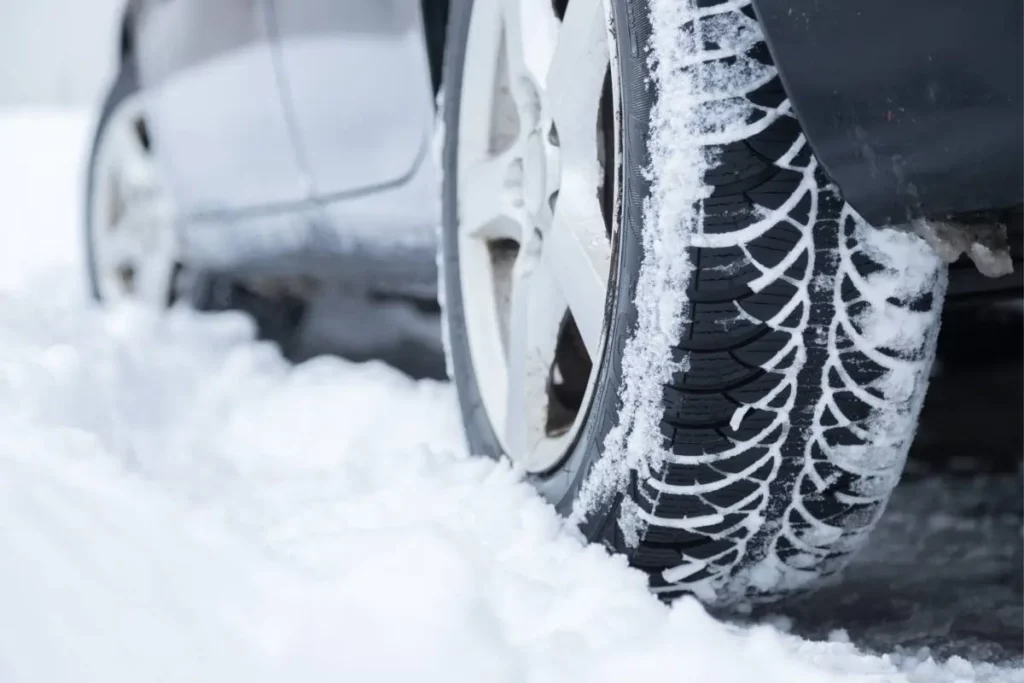One of the reasons that people want run-flat tires is that they can still run for 50 miles on a flat. This allows the driver to make it to a safe place, so they aren’t left stranded on the side of the road.
However, when winter comes, you may find yourself asking, “are run-flat tires good in snow?“
Run-flat tires can be good in the snow if you have chosen the right tire to drive with. Like any type of tire, summer run-flat tires won’t deliver a good performance in winter conditions. Always make sure you are using the right run-flat tires for the current season.
Have you ever wondered if your run-flat tires will be good when it snows? You’ve come to the right page.
Today, we’re going to discuss everything you should know about how fun flat tires perform in the snow. Keep reading to learn more.

Are Run-Flat Tires Any Good in Snow Conditions?
If you are using winter run-flat tires, you should be able to drive well in the snow. This is because the tread will be designed for winter driving conditions.
The reason there are summer tires and winter tires is that each type is made using a different formula. Changes in temperature can change how the grip and traction on the tires work.
When it’s hot in the summer, the tire will need soft grips and wide blocks. This makes them suitable for driving in dry or rainy conditions.
However, in the winter months, the cold temperature makes those grips hard, so the tires won’t perform well.
In order to ensure the run-flat tires are safe for winter driving conditions, tire manufacturers will need to use a different formula.
So, what it stems down to is whether or not you’re using the right run-flat tire in the wintertime. If you make the switch to winter run-flat tires, you shouldn’t have a problem driving in the snow.
However, if you keep your summer tires on, they won’t be good in the snow.
Can You Drive All-Season Run-Flat Tires In Winter?
All-season tires are made to be driven in both cold and mild temperatures. With a good quality set of all-season run-flat tires, you should be able to drive in the winter.
These tires are manufactured to be durable throughout different temperature ranges.
However, you really need to think about the climate you live in before considering whether or not these tires are a good choice.
If you live in a climate that has beautiful summer days but well below freezing temperatures in the winter, you may want to choose season-specific run-flat tires.
That will ensure a safer driving experience. All-season run-flat tires are better for climates that have reasonably mild winters.
What Are The Disadvantages of Run-Flat Tires In Snow?
The tread of a tire is very important for safe driving in the winter.
One of the biggest disadvantages of driving with run-flat tires in the snow is that the treads are known to wear to quicker than other tire types.
This is because run-flat tire manufacturers use a softer compound when formulating the tread.
The reason that the tread on these tires is softer than other tire types is that they are designed to make the ride more comfortable.
One of the issues that many drivers have with run-flat tires is that they create a very harsh riding experience. Passengers can feel every bump and stone on the road.
The softer tread reduces that effect, so people stay comfortable.
Since the tread wears out quicker, drivers need to replace their run-flat tires more frequently. This can become very costly because run-flats are considered premium tires.
Not only are they also difficult to find on the spot, but most local tire shops will have to have them ordered in, leaving you waiting longer.
What Type Of Run-Flat Tire Works Best In Snow?
If you’re looking for a good set of run-flat tires to use in the winter, it’s very important to take a look at the tread.
The best types of winter tires will have deep and jagged treads to provide optimal traction in the snow. The tread will also be wide, so the run-flat tires will have good traction when the roads get icy.
When choosing a material, rubber is always best in winter. It will perform best in cold conditions and has a longer lifespan.
To ensure you stay comfortable driving, try to choose a winter run-flat tire that features shallower grooves. These help to reduce the spring, so you’re more comfortable while driving.
Final Thoughts
Are run-flat tires good in snow? If you are driving with winter run-flat tires, they will be good for driving in the snow.
Depending on how cold and how much snow there is, all-season run-flat tires can also be a good choice.
However, they are better suited for climates with a milder winter. If winters are quite snowy in your area, you should choose season-specific tires.
However, if you try to drive in the snow with summer run-flat tires, you won’t have a good experience. Summer run-flat tires are made from a different compound than winter tires.
The summer tire compound used in the grip becomes too hard when the temperatures drop. This causes the driver to have very poor traction in the snow and on icy roads.
This rule of thumb isn’t exclusive to run-flat tires. It applies to any type of tire your choose to drive with. Additionally, you shouldn’t use winter run-flat tires in the summertime.
They are specifically designed for cold weather and are at risk of problems when driven in the heat.
Winter tires aren’t effective when it’s hot, and the summer conditions could lead to a tire blowout.